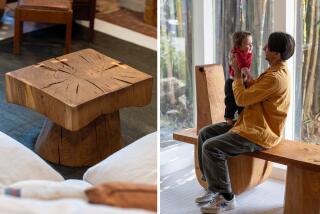Rozzell Sykes; Artist Founded St. Elmo’s
- Share via
Rozzell Sykes, founder of St. Elmo’s Village, an eruption of rainbow-colored bungalows, sheds and garages set amid what was once the squalor of a decaying neighborhood, has died.
A spokesman for the village said Saturday that Sykes was believed to have been in his 60s. The cause of his death Dec. 18 is unknown, pending an autopsy.
Sykes was an artist with a self-developed style of craftsmanship when he came upon the area, along St. Elmo Drive near Venice Boulevard and La Brea Avenue, in 1961.
Soon, a nephew, Roderick Sykes, joined his uncle in what Rozzell Sykes envisioned as a kind of ministry.
Rozzell Sykes, the self-styled village elder, had found “only despair, lack of confidence, (and) fear” in the neighborhood when he arrived.
Believing that anyone can find success within himself, Sykes began improvements that included paint, plants and color, particularly the latter.
He began to enlist not only residents of the small neighborhood but their elected officials, and came to count among his supporters future Mayor Tom Bradley.
Sykes painted anything that didn’t move. Sidewalks were decorated free-form in reds and yellows; metal sculptures of bulls, women and children seemed to grow from tree trunks. The small wooden bungalows built in the 1920s now looked out on verdant gardens.
“We use what we have,” Sykes was telling visitors by the early 1970s as he surveyed mounds of donated scrap metal and other materials.
St. Elmo’s by then was being dubbed “The Little Village That Could” and was soon accorded nonprofit status to aid fund raising.
Workshops in photography, painting, graphics, music, writing and computers were arranged for children and adults.
By 1971, the Sykeses were able to raise $10,000 from a Memorial Day festival for a down payment on the property which the landlord was going to convert into an apartment complex.
As it matured, St. Elmo’s came to be seen as an oasis in the heart of a giant city.
“This is the very epitome of urban renewal, of survival,” Sykes would tell visitors. “You use what you have.”
Toward the end of his life, Rozzell Sykes had begun moving toward a new creative center for artists he was going to call Cafe de Arte.
He was divorced from Erma Sykes. He is survived by two sons and three daughters.





